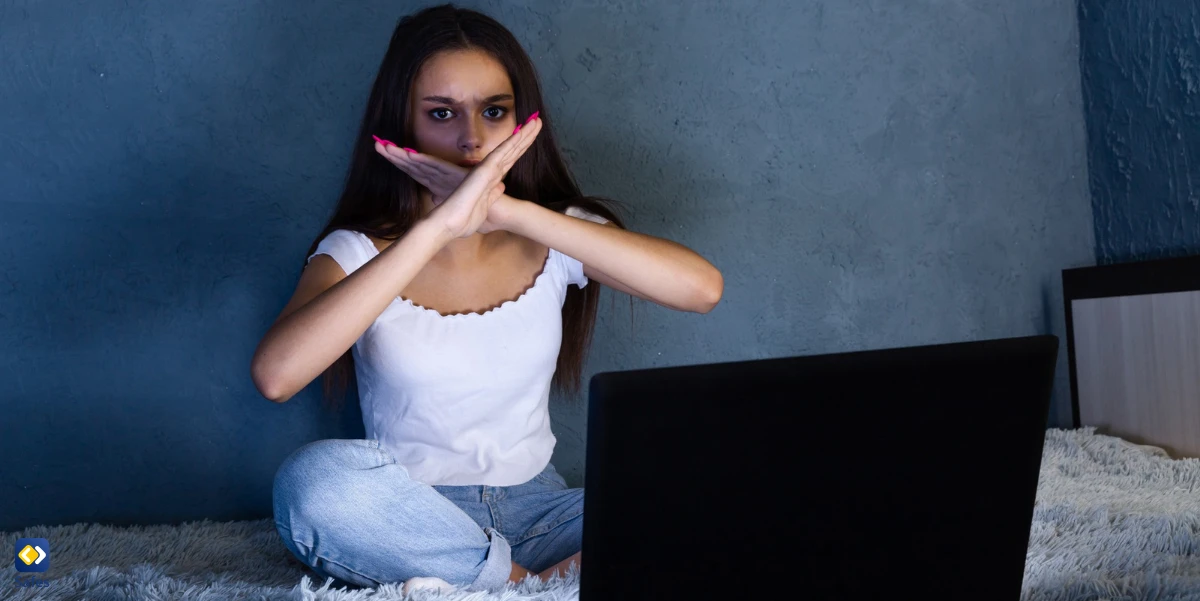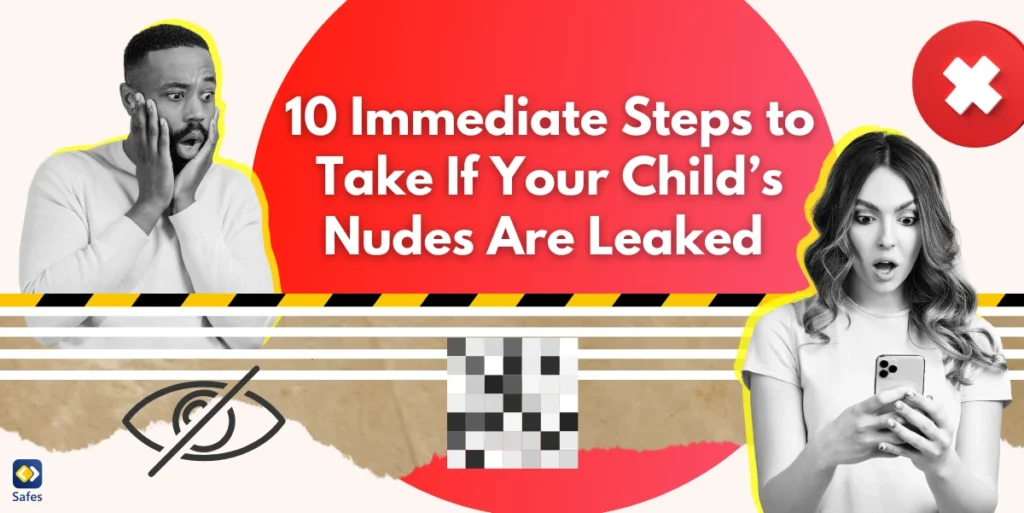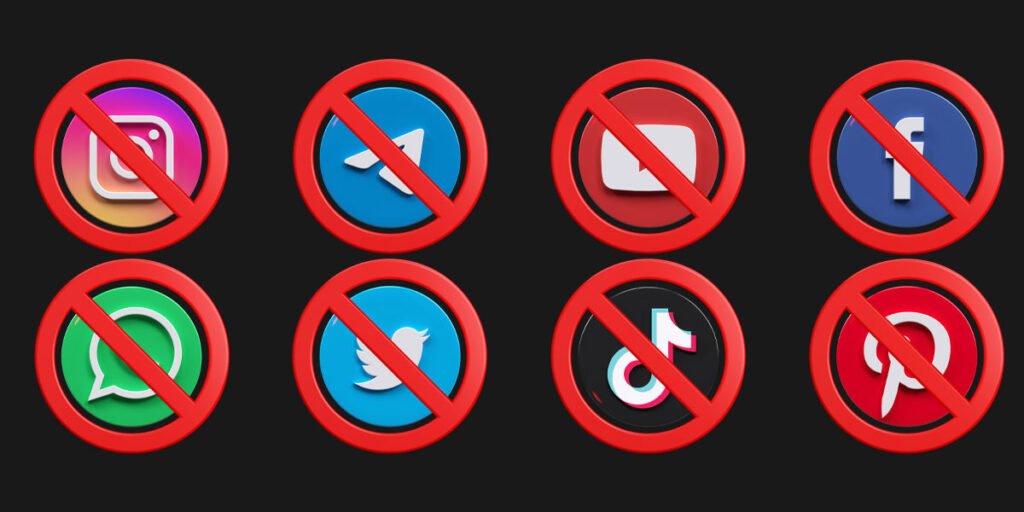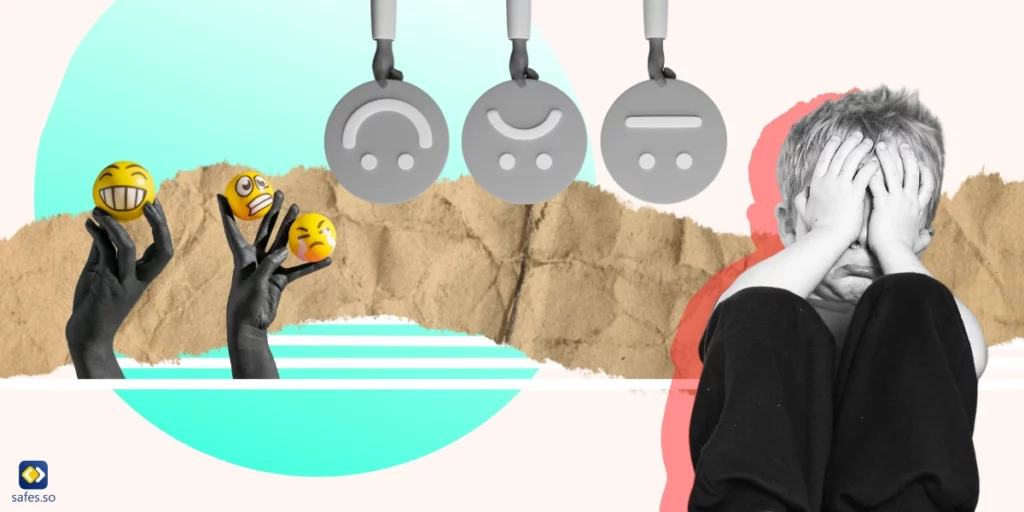Discovering that your child’s nudes have been leaked is a parent’s worst nightmare. It’s a deeply distressing experience that demands immediate and decisive action to minimize harm and protect your child. Knowing what to do if someone leaks your child’s nudes is crucial in such a situation. In this blog, we outline ten essential steps you must take if your child’s intimate photos or videos are shared online, whether on websites hosting leaked nudes or social media platforms. Stay tuned to the end for helpful resources. Knowing what to do can make a world of difference during this challenging time.
Download and Start Your Free Trial of the Safes Parental Control App
1. Stay Calm and Reassure Your Child
When your child’s nudes are shared online, it’s natural for you and your child to feel overwhelmed. However, you have to stay calm so you can guide your child through this situation.
Reassure your child that they are not alone and that you are there to support them. A calm and composed demeanor will help them open up about what happened, whether someone threatens to leak their nudes, or if the images are already online. Assure them that you will work together to address the issue and protect their well-being.
2. Understand the Situation Thoroughly
Before taking further steps, gather all the relevant information. Ask your child about how the incident occurred and whether the images were shared consensually or stolen.
This understanding will help you determine whether someone is threatening to leak the images or has already uploaded them to a website featuring leaked nudes. Having a clear picture will also help when you report the incident or take legal action.
3. Report the Content to the Platform
If nude images or videos are circulating on a social media platform, report the explicit content immediately. Most platforms have guidelines against sexually explicit content and will remove it promptly.
Provide the necessary details, such as links or screenshots, to help the platform locate and remove the images. Remember, acting quickly can limit the spread of the content and reduce its visibility.

4. Document Evidence of the Leak
Even though it may feel uncomfortable, it’s a good idea to document the leaked nude picture or video. Take screenshots or record links to show where the intimate images include your child’s content.
This documentation is essential for pursuing legal action and reporting the incident to the authorities. Clear evidence can strengthen your case against the perpetrator who shares or threatens to share the images.
5. Contact the Authorities
If someone is threatening to leak your child’s nudes or has already done so, report the incident to the police. Sharing intimate photos or videos of minors is a criminal offense in most jurisdictions, regardless of consent.
Provide all the evidence you’ve gathered, including screenshots and URLs. Authorities can help identify the person responsible for sharing the images and take action against them.
6. Consider Legal Action Against the Perpetrator
Legal action is a powerful tool to hold the perpetrator accountable. Consult a lawyer experienced in handling cases involving explicit content to understand your options.
You can explore charges for harassment, invasion of privacy, or child pornography, depending on the situation. Taking legal action can also serve as a deterrent for others who might think about sharing such content.
7. Request Removal from Websites with Nude Content
If the content appears on websites displaying nude content, contact the site administrators to request its removal. Most websites comply with such requests when provided with proof of identity and ownership of the content.
Explain that the nude image or video involves a minor or was shared without consent. Ensure you follow up to confirm that the explicit content has been taken down.

8. Provide Emotional Support to Your Child
Experiencing the leak of intimate images or videos can severely impact a child’s mental health. Make time to listen to your child, validate their feelings, and reassure them that they are not at fault.
Consider seeking the help of a counselor or child therapist to address any lingering trauma or emotional distress. Professional support can help your child rebuild their confidence and move forward.
9. Educate Your Child About Online Safety
Prevention is an essential part of dealing with these situations. Talk to your child about the risks of sharing sexual images, even with trusted individuals.
Encourage them to think critically about what they share online and explain how quickly content can spread. Empower them to say no if pressured to share their nudes, regardless of who is asking—whether it’s a family member, a close friend, or a stranger.
Additionally, consider using parental control tools like Windows parental controls or dedicated parental control apps to create a safer online environment for your child. These tools can help you monitor their activity, set boundaries, and block access to unsafe platforms, fostering better digital habits while keeping your child protected.
10. Use a Parental Control App to Protect Your Child
Technology plays a vital role in preventing and addressing these incidents. Safes, a simple to use parental control app, can help protect your child online and respond to threats effectively.
With Safes, you can monitor your child’s digital activity, block unsafe websites, and set up alerts for potentially harmful behavior. In cases where someone threatens to leak their nudes, Safes helps you take proactive measures to ensure your child’s safety.
Safes, available on Android and iOS, is here to support you in protecting your child. Start your free trial today and explore how Safes can protect your child online.
Conclusion
Leaking nudes is a traumatic experience for both the victim and their family. Knowing what to do if someone leaks your child’s nudes can make a significant difference in minimizing the damage and holding perpetrators accountable. By staying calm, taking legal steps, and providing emotional support, you can help your child navigate this crisis.
For additional support and resources, consider reaching out to organizations like Childhelp USA, the Cyberbullying Research Center, or the free Take it Down service of the National Center for Missing and Exploited Children. These organizations offer guidance and assistance to victims of online exploitation and child sexual abuse.
Your Child’s Online Safety Starts Here
Every parent today needs a solution to manage screen time and keep their child safe online.
Without the right tools, digital risks and excessive screen time can impact children's well-being. Safes helps parents set healthy boundaries, monitor activity, and protect kids from online dangers—all with an easy-to-use app.
Take control of your child’s digital world. Learn more about Safes or download the app to start your free trial today!




